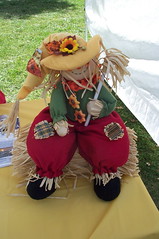
Welcome to the Carnival of the Recipes! First off, I need to introduce you to our host, Pumpkin Spice.
What you need to understand is that Pumpkin Spice is not a person. She's an ad. For coffee, actually.
In 2002, I went to the World Science Fiction convention in San Jose. Upon my return, I was informed that I needed to draw Pumpkin Spice. Naturally, my reaction was "Huh?" But the explanation is quite simple. Pumpkin Spice was a coffee that Borders used to sell (until the café portion of the stores was taken over by Seattle's Best.) Every fall, there was an inter-store competition to see who could sell the most.

My co-workers had, while I was gone, decided that Pumpkin Spice had left the Spice Girls and that I needed to illustrate her. By Tuesday, of course.
Or Monday if I could manage it.
That year's Pumpkin Spice was rather quick, a quasi-anime witch with orange hair. By the next year, when I knew I couldn't get out of it, she'd gotten more towards the perky Goth mode. (Those versions are archived on DVD somewhere and I couldn't find them right now.) And 2004 was the last year of Pumpkin Spice coffee.
Incidentally, we won the competition all three years for our region; by store volume, we sold the highest percentage of bags. More than once, it was the result of someone doing a double-take at the illustrations, then asking for a sample. Witness the power of advertising.
But I missed Pumpkin Spice, so I decided to bring her back. So now on to the food!

As I mixed the proper proportions of my coffee, Teldra said, "How do you brew klava?"
"You don't know?"
She smiled. "I can serve it with the best, but I've never needed to learn how to brew it."
"You press coffee through a filter made of eggshells and wood chips with vanilla bean, then reheat it so it almost boils, then you pass it through a cloth to remove any oils brought out by the reheating."
"Wood chips?"
"Hickory works well, also fegra, cherrywood, and crocra. It's the wood, or combination of woods, that makes each version unique. Well, and how much vanilla you use. Also, some people add cinnamon, but I don't; cinnamon is just as good if you add it later. Everyone has his own recipe. Valabar's does it best, but they do everything best. I miss Valabar's."
—Issola, Steven Brust
Why not celebrate autumn with a warm drink?
The Egoist has an idea to
spice up your chai. Let us know how that turns out, because as a mild aficionado myself, I won't be trying it.
Morning Coffee and Afternoon Tea submits a
Cranberry Harvest Tea recipe. The wonderful part about this is that you can start with any black tea you happen to have on hand.
The Common Room linked to
this "Russian Tea" recipe as a side for their submission. It's come to the Carnival before, but it's welcome this time as well!

Two troopers in white jackets appeared, quickly setting plates before each officer. On each plate were thin strips of something covered with a glaze.
Alucius tried the first course, discovering it was some sort of tangy fish, covered with a lemon-almond glaze that went down easily.
"Have you had lemon-smoked oarfish before?" asked the majer.
"I'd had oarfish, but not prepared this way," Alucius admitted. "What I've had wasn't nearly this good."
—Darknesses, L.E. Modesitt
The salmon are running and the salmon recipes are coming in.
The Common Room's
Salmon Chowder can be made at any time, as it only requires canned salmon. Provide your own glutton; the First Year Boy is not available in most states.
Foodies Across Borders present a salmon recipe that is
grilled on a cedar plank and served with lemon-chardonnay sauce. Their timeline goes from "a bit in advance" (soak the cedar plank) through "salivating yet?"
Yea, verily, yea.
Kate of
Electric Venom posts what she should do
Before My Basil Starts Dying. (She should make pesto, that's what.)
"Hercule Poirot says there's always something that no one noticed or thought was important," she said, picking up the Stag At Bay.
Inside was a mass of pungent-smelling brown objects. "What's that?"
"Devilled kidneys," she said, "braised in chutney and mustard. In Hercule Poirot mysteries, there's always one little fact that doesn't fit, and that's the key to the myster." She picked up a charging bull by the horns. "This is cold ptarmigan."
"Aren't there any eggs and bacon?"
She shook her head. "Strictly for the lower classes." She held out a shellacked fish on a fork. "Kipper?"
I settled for porridge.
—To Say Nothing of the Dog, Connie Willis
To take a slight detour, American Inventor Spot points us as
The Makeover of Everyday Salt. Most of us know about fancy salts, from various sea salts to kosher flake salt (my fave), but table salt? It turns out that a simple change might make everyone's lives a little easier...
And
Meanderings found
an online cook's thesaurus. It will let you know about conversions and substitutions and weird name changes. While good international cookbooks will do the same (I love how the bargain publisher Hermes House has conversions for all English-speaking countries; "divided by a common language," indeed), it's nice to have a central reference point for the times when you just can't find "aniseed" and you're looking straight past the fennel...

Of all the wonderful food that his spouse produced, Uncle Sebastian most adored the uniquely Devon cream tea— scones, clotted cream, and jam. Margherita made her very own clotted cream, which not all Devon or Cornish ladies did— a great many relied on the dairies to make it for them. The shallow pan of heavy cream simmering in its water-bath would certainly make Uncle Sebastian happy when he saw it.
—The Gates of Sleep, Mercedes Lackey
What is autumn without baking bread?
Kicking Over My Traces shows us a recipe for
Seven Grain Bread, and a
link with photos.
A Weight Lifted takes advantage of the fall fig-harvesting season (which is a bit earlier for Calmyrna figs in places like my parents' front yard) and submits a recipe for
Pistacio and Fig Bread. And it's healthy too.

"Is there any supper?"
"There'th walago,* noggi,** sclot,*** swinefletht and thauthageth," said Igor, still clearly upset about the trophies. "I'll thop tomorrow, if Her Ladythip giveth me inshtructionth."
"Is swineflesh the same as pork?" said Vimes. People in drought-stricken areas would pay good money to have Igor pronounce "sausages."
"Yes," said Inigo.
"And what's in the sausages?"
"Er... meat?" said Igor, looking as though he was ready to run.
"Good. We'll give them a try."
———
*A kind of pastry made from curtains.
**Buckwheat dumplings stuffed with stuff.
***Bread made from parsnips, and widely considered to be much tastier than the dull wheat kind.
—The Fifth Elephant, Terry Pratchett
Elisson posts about
Meat R Us; how central meat is to the human condition, and how important it is for holidays. He also shows off a lovely beef brisket in the process.
Suite 101— a site for the curious— tells us a little about
Kobe Beef: what it is, how hard it is to cook, and the less expensive varieties that are still Kobe. Apparently, while Kobe beef is fatty, it's unsaturated and therefore heart-healthy. I had no idea.
And though
a geezer's corner didn't send this link in directly, who can deny that
A Simple Steak is a marvelous way to have your beef? "It's what's for dinner", indeed.
For a change of pace,
Trinity Prep School submits a
Cheese Soup Supper. As they say, this soup's a winner; warm and cheesy.

Janet spread the paper napkin on her lap, picked up her dish of stewed tomatoes, and said, "Now don't look. I'm going to mush these into the macaroni and cheese."
Sharon covered her face with her hands. Nora said, "I've already watched Sharon pepper her cottage cheese until it turned gray; what's a few tomatoes to that?"
—Tam Lin, Pamela Dean
Everything and Nothing has sent in a recipe for
Creamy Cajun Shrimp Linguine this week. It's a Mississippi water harvest! (You may also like to know that although she only sends in one recipe every week, Everything and Nothing is chock full of recipe goodness, including things you've never heard of. Sweet and Spicy Bacon. Dessert Nachos. Grenadine. Eggplant Chips. Quite a read.)
It's getting to crockpot season, and
triticale submits a
Red Beans & Smoked Sausage beauty that looks like the perfect thing to set up the night before, put in the slow cooker in the morning, and come home to at the end of an exhausting day. Bet it makes the house smell
wonderful.
Riannan of
In the Headlights joins in the fun with a
One Pot Meal that involves corn, rice, and chicken.
Disease Proof also submits chicken, a
vaguely Asian trio of recipes that make for a very healthy (and tasty!) meal.
Mom Advice does them one better, in a
One Pan One Step Chicken and Potato Bake.
Mom or not, you can't deny how wonderful a one-step cooking process is.
Me-ander (not to be confused with Meaderings, above) submits two recipes;
Nameless Leftover Noodle Surprise nd One Pot's Enough For Me (Rice & Veggies).
Seriously Good turns to fall recipes, in this case
Kraut-style Pork Chops and Sauerkraut (Choucrote). Pork chops speak of fall to me as well, though my family went for the simple fried chops with applesauce. As you might expect, we kids tended to have the applesauce on the side, in copious amounts and with cinnamon aplenty.
What would harvest be without pumpkin recipes?
Famous Recipes presents a
Fall Pumpkin Cider Bread. My dirty little secret is that I have never in my life cooked anything pumpkin myself. Not seeds and certainly not bread. I guess the excuse "but I don't have a recipe" won't work anymore.
Not everyone is rushing towards fall.
Post-Haste Taste submits a recipe for a
Late-Summer Vegetable Mixture. Just going a little crazy for lunch. This is another gorgeous blog about food. I could link the whole thing.
Blabber Heads is steering clear of the whole pumpkin thing and instead submits a recipe for
Stuffed Bell Peppers. It looks fascinating, but for some reason bell peppers never make it long enough to get stuffed in my vicinity.
Mmm. Sliced fresh bell peppers.

I drizzled liqueur on the strawberries— sparingly, however glad the Ticker might have been to squander the stuff on mere mortals. The smell made me want to lie down in the bowl.
Tick-Tick handed me a bowl and a whisk, and pointed at the milk bottle. "Pour the cream off the top of that and whip it, would you?"
"Wait a minute. That's work."
"It's exercise. Do you good before breakfast."
[...]
The alcohol was gone from the liqueur, the strawberries were warmed and softened, and some of the sugars had caramelized. The waffles were crisp all around the edges and soft in the middle. And the Ticker had stopped me just in time on the whipped cream. There was hot tea to wash it down with, which tasted something like Darjeeling and something like not. It was related to last night's shower: it was a meal to make me grovellingly happy to be alive.
—Finder, Emma Bull
Stop the Ride! has a lovely thought about
free apples, and a pie recipe to go with it. Since Stop the Ride! is dedicated to reducing financial problems by living beneath your means, an offer of free apples is not to be refused.
And speaking of apples, writer
Diane Duane has a two-part recipe for an apple tart. The crust is
here while the delectable apple filling is
here.
A geezer's corner tells us of how a rice-cooking accident led to
Arborio Rice Pudding. We've all been there, I'm sure; just reaching into the cupboard and grabbing the wrong thing. In this case, though, the end result looks fabulous.
And finally, we end with
Men In Aprons' submission, a simple recipe for
Chocolate Gooey Butter Cookies. Because every meal deserves chocolate cookies.































